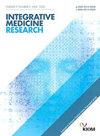Non-pharmacological interventions involving traditional Chinese medicine for assisted reproductive technology: A group consensus
IF 3
4区 医学
Q2 INTEGRATIVE & COMPLEMENTARY MEDICINE
引用次数: 0
Abstract
Background
Assisted reproductive technologies (ART) are being increasingly utilized for mitigating fertility problems. Nonpharmacological interventions of traditional Chinese medicine (TCM) are widely used as an adjunct to ART, which may improve the rate of pregnancy. Currently, no standard treatment guidelines or consensus are available for non-pharmacological interventions of TCM for patients undergoing ART. The aim of this study was to establish a consensus on the use of non-pharmacological TCM interventions during the ART treatment cycle.
Methods
This study utilized existing data and developed a consensus among a panel of experts on non-pharmacological interventions of TCM for ART. Through face-to-face or online contact, the listed recommendations were revised one by one, and a consensus was reached when >70 % of the experts agreed with the recommendation. The writing group of the expert panel then created the first draft of the expert consensus based on the discussion in the first round. The second round was held to reach a consensus on content improvements based on the opinions of the experts in the previous round.
Results
After the literature search, a total of 873 related articles were retrieved, and 59 studies were ultimately included according to the inclusion and exclusion criteria. After two rounds of the survey, a total of 24 experts from 18 Chinese provinces across China and five international experts from the United Kingdom, Korea, and Serbia provided vital insight and support for the formulation of this consensus. The consensus outlines eight non-pharmacological interventions for seven different stages of the ART cycle and three major complications during ART, involving 23 items of clinical practice recommendations.
Conclusions
Expert consensus provides a foundation for integrating non-pharmacological TCM interventions into clinical practice during ART. As more high-quality, large-scale, multicenter clinical trials are conducted, these recommendations may be refined and updated to better inform clinical guidelines and improve patient outcomes in ART.
中医药辅助生殖技术的非药物干预:群体共识
辅助生殖技术(ART)正越来越多地用于减轻生育问题。中医非药物干预被广泛应用于辅助抗逆转录病毒治疗,可以提高妊娠率。目前,对于接受抗逆转录病毒治疗的患者,中医药非药物干预尚无标准的治疗指南或共识。本研究的目的是建立在抗逆转录病毒治疗周期中使用非药物中医干预措施的共识。方法本研究利用现有数据,并在专家组中就中医药非药物干预抗逆转录病毒治疗达成共识。通过面对面或在线接触,对列出的建议逐一进行修订,当70%的专家同意建议时达成共识。专家组作文组在第一轮讨论的基础上,形成专家共识初稿。第二轮会议是在前一轮专家意见的基础上就内容改进达成共识。结果经文献检索,共检索到相关文献873篇,根据纳入和排除标准最终纳入59项研究。经过两轮调研,来自全国18个省区的24位专家和来自英国、韩国、塞尔维亚的5位国际专家为这一共识的形成提供了重要见解和支持。共识概述了针对抗逆转录病毒治疗周期的7个不同阶段和抗逆转录病毒治疗期间的3个主要并发症的8种非药物干预措施,涉及23项临床实践建议。结论专家共识为在抗逆转录病毒治疗过程中将中医非药物干预纳入临床实践提供了基础。随着更多高质量、大规模、多中心临床试验的开展,这些建议可能会得到完善和更新,以更好地为临床指南提供信息,并改善抗逆转录病毒治疗患者的结果。
本文章由计算机程序翻译,如有差异,请以英文原文为准。
求助全文
约1分钟内获得全文
求助全文
来源期刊

Integrative Medicine Research
Medicine-Complementary and Alternative Medicine
CiteScore
6.50
自引率
2.90%
发文量
65
审稿时长
12 weeks
期刊介绍:
Integrative Medicine Research (IMR) is a quarterly, peer-reviewed journal focused on scientific research for integrative medicine including traditional medicine (emphasis on acupuncture and herbal medicine), complementary and alternative medicine, and systems medicine. The journal includes papers on basic research, clinical research, methodology, theory, computational analysis and modelling, topical reviews, medical history, education and policy based on physiology, pathology, diagnosis and the systems approach in the field of integrative medicine.
 求助内容:
求助内容: 应助结果提醒方式:
应助结果提醒方式:


